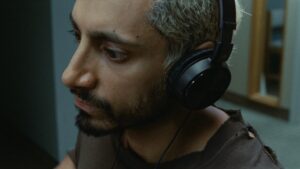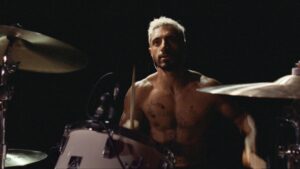
The Amazon Studios film, Sound of Metal, from writer/director Darius Marder, explores the sound perspective between the world and the diminishing hearing of a person going deaf. After years of playing drums in a heavy metal band with lead singer and longtime girlfriend Lou (Olivia Cooke), Ruben (Riz Ahmed) drastically loses his hearing as he struggles, copes, and deals with this life altering ailment. Supervising Sound Editor and Composer Nicolas Becker (Gravity, Arrival) had to creatively discover how to portray, disrupt, modify, and attenuate the audio perspective from extremely loud to absolute silence through the perception of hearing damage.
Much experimenting occurred, regarding how sound is incomparable through the ears of someone born deaf contrasted with one losing their hearing. “If someone was born deaf, they have no idea about how they can speak about sound. If someone was born with hearing, they actually have experienced sound for many years and are able to describe it. We get a lot of information from people who have lost hearing. We ask them to describe how it feels to have these cochlear implants. What I always get, it’s the idea of the sound; but it’s the experience, the mood, and feelings of it,” Becker explained.
As a Foley Artist for many years, Nicolas Becker’s first intuition would be gathering real materials, rather than relying on a pre-made sound effects library. The supervising sound editor enlightened, “From the Foley experience, I went to do a lot of field recordings, underwater recordings, monitoring volcanoes, using geophones to get the sound of the hertz, recording low frequency radio, and the electromagnetic storm. I’ve been working with some films where the immersive experience was very important, such as Gravity or Ex Machina. I developed some tools and experimented a lot about what we can hear and feel with no ears. If we lose our hearing; everything we can hear is through the body, bones, and vibrations of the shirt. I put sensing on his body to be able to get sound from the perspective of the bones, the flesh, and the skull. All of that, our brain transforms it to sound. The body experience is very important because it’s much more direct.”

When Ruben receives the cochlear implants, it transmits a unique and specific sound. “I wanted to have something which was really digital sending to the nerves or the cochlea; not coming from the acoustic, electronic, or electric world. We took each sound and divided in three different layers being harmonic, noise, and transient content and then recombine them. We didn’t recombine it physically, but we kept it as separate tracks to have the ability to create something very organic. We are able to divide the numeric world in digital way of understanding the sound to create these three layers. We are decomposing and recomposing these things because the delay of treatment is different. It starts to create this search way of things, which were very close to the description of the hearing-impaired people,” Becker said.
The sound editor continued, “I started with the idea that if someone is lost in space, it’s because the information is similar from all the directions. The brain is not about to recreate the space of diffusion. It’s as if someone has never been in a jungle, everything sounds like mono because they don’t know if they are hearing insects, birds, or everything. Then we start to know more and more and things start to open. The brain has this ability to be able to recreate space through the information given to it. The other option was the information is so contradictory that our brain is not able to analyze them. I preferred the second one because it brings more of the idea of confusion. We went with the first option because the director felt that it was much more important to be autonomous, the idea of not being so much related with picture, but really in the sound.”

The dynamic range in the film shifts from extremely loud to absolute silence. Becker contrasted, “In the first concert, we wanted to have a strong experience. The first sequence and the last sequence are the scale of the film. We are giving the two extremes with louder without being painful to nothing. To play with that and the scale of it. When people think silence, there’s still a small hiss. Most of the time, there’s a confusion in films when doing silence. The director wanted absolutely nothing. It’s this idea where the orchestra is not playing and everybody starts to listen to the acoustics of the room suppressing of the people. It creates a kind of depression, not like an explosion. We wanted to bring this feeling to the audience at the end to have this experience in silence.”
Sound of Metal delves deep into the perception of hearing loss and the emotional impact associated with that impairment. Becker captures sound that encompasses all perspectives from the lead character to the audience with the use of generating original sounds through real materials. To enhance hearing impaired authenticity and sound feeling, various vibrational techniques were penetrated to the body, bones, skull, and clothes. The vast spectrum of sound perception is demonstrated from the loudest elements to absolute silence and everything in-between.
Sound of Metal will premiere on Prime Video after two weeks in theaters. You can check out Below the Line’s review of the film here.





